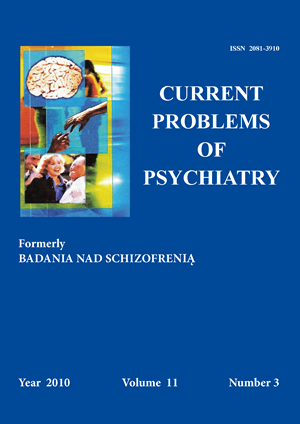Knowledge about autism among psychology and medical students
Keywords:
autism, medical students, psychology students, level of knowledgeAbstract
Autism is a development disorder of the brain that impairs social interaction and communication, and causes restricted and repetitive behaviour, the first symptoms of which appear before a child is three years old. Moreover autistic individuals may have characteristics that are independent of the diagnosis, but that can affect the individual or the family such as: extraordinarily rare talents (autistic savants), unusual responses to sensory stimuli, atypical eating and sleeping behaviour or distorted development of motor skills.
The aim of the study was to estimate the knowledge about autism among medical and psychology students from Polish universities.
The study was carried out with use of anonymous surveys consisting of problem questions (multiple-choice and open-end questions), and additional questions about personal demographic data.
The results showed that both psychology and medical students derive more of their knowledge about autism from movies than from textbooks, especially in the field of pharmacological treatment and physiotherapeutic systems. However students correctly pointed the frequency of this disorder. It is also very important that students did not point the mistakes of parents or lack of parental love as the cause of autism, that had been presented in previous studies and literature. The results showed the lack of interest in autism. It is not optimistic, because these two groups of professionass most often deal with problems of autism. There is still great need of popularization of knowledge of this development disorder of brain among all the students of medicine and psychology in Poland.
References
1. Kanner L. Autistic disturbances of affective contact. Nervous Child, 1943; 2: 217-250.
2. Miłkowska G. Autyzm znany czy nieznany. Szkoła specjalna, 1990; 2(3): 83-89.
3. Łęczycka J. Stan wiedzy o autyzmie w badaniach empirycznych. W: Dykcik W. red., Autyzm, kontrowersje i wyzwania. Poznań; Wydawnictwo Eruditus: 1994, s. 209-216.
4. Pisula E. Wiedza o autyzmie. Część I: Studenci. Dziecko Autystyczne, 1998; (2): 6-9.
5. Pisula E., Rola J. Wiedza o autyzmie. Część II: Nauczyciele. Dziecko Autystyczne, 1998; 6(2): 10-15.
6. Klasyfikacja zaburzeń psychicznych i zaburzeń zachowania w ICD-10. Uniwersyteckie Wydawnictwo Medyczne „Vesalius”: 1998.
7. American Psychiatric Association Diagnostic and Statistical Manual of Mental Disorders-IV. Washington; DC: APA: 1994.


